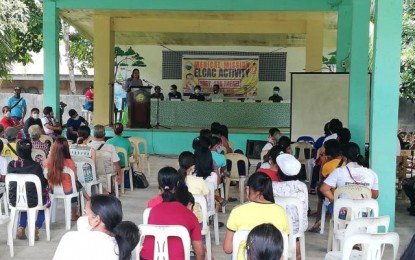
ELCAC ORIENTATION. Residents of San Remigio, Antique during the orientation and medical mission held last December 2020 by the Antique Provincial Task Force ELCAC in San Rafael Elementary School. San Remigio Municipal Mayor Margarito Mission, Jr. and Sibalom Mayor Gian Carlo Occena have issued statements of support to the NTF-ELCAC projects to be implemented in their identified barangays. (PNA file photo by Annabel Consuelo J. Petinglay)
SAN JOSE DE BUENAVISTA, Antique – Two town mayors in this province are looking forward to the implementation of projects in their barangays that were previously affected by the local insurgency.
In a statement on Tuesday, San Remigio Municipal Mayor Margarito Mission, Jr. said they fully support the farm-to-market road project in Bulan-Bulan to be funded under the National Task Force to End Local Communist Armed Conflict (NTF-ELCAC) Barangay Development Program (BDP).
“The project responds to the pressing need of the barangay and its people in the opening and concreting of a farm-to-market road (FMR) in the amount of PHP20 million,” he said, adding the road construction will provide access for people to bring their produce from their upland barangay down to the town market.
Barangays Bulan-Bulan in San Remigio town and Cabladan in the municipality of Sibalom are identified recipients of projects of the BDP.
From the PHP16.5 BDP funds, each barangay will receive PHP20 million.
Barangay Bulan-Bulan is around five to six kilometers away from Barangay Aningalan, which is the last barangay with a concrete road.
Pedro Raymundo, Bulan-Bulan chairperson, in a previous interview, said their village has been longing for a concrete road for so many years to easily bring their rice and other agricultural products to the town market.
Raymundo and other barangay representatives had their planning workshop for their BDP with the Department of the Interior and Local Government on October 13, 2020.
Meanwhile, Sibalom Mayor Occeña, in a statement, likewise expressed enthusiasm and support for the full implementation of barangay projects.
Occeña said the PHP20 million allocation for Barangay Cabladan will be used for the concreting of the one-kilometer FMR in Sitio Apong in the amount of PHP12 million; electrification of the 33 households in Sitio Costan costing PHP3 million; construction of the two-unit school buildings in Sitio Apong and Sitio Tiguidan at PHP2.15 million; and, construction of Level II water system worth PHP2.8 million.
“The residents of the hinterland Barangay Cabladan are already expecting for the projects to be implemented,” he said. The barangay is located 17 kilometers away from the town proper.
In a separate interview on Tuesday, Sibalom Municipal Social Welfare and Development Officer Dominga Zarragosa said with the implementation of the Whole-of-Nation-Approach as mandated by Executive Order 70, residents of Cabladan have been receiving training and services from the government.
She added that villagers felt neglected in the past and were vulnerable to the influence of the Communist Party of the Philippines-New People’s Army (CPP-NPA).
“Barangay Cabladan is a mountainous area that is in the boundary of San Joaquin and Leon of Iloilo province where the CNTs (communist NPA terrorists) are hiding,” Zarragosa said.
She added that she was told by Cabladan barangay captain Porfirio Cabigunda about the death of their chief village watchman 10 years ago perpetrated by CNTs thus they decided to arm themselves as protection against the insurgents.
“The residents even sold their cows and agricultural produce to buy arms for their protection,” she said. (PNA)
